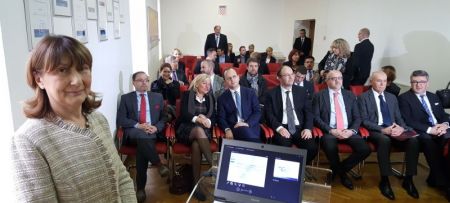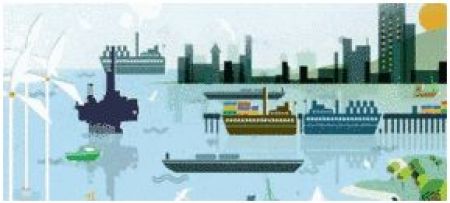On 23 February 2017, Ms. Ségolène Royal, French Minister of the Environment, the Sea and Energy, in charge of international Relations on Climate, welcomed in Paris a large panel of participants from all around the Mediterranean - ambassadors, representatives of national authorities, scientific experts, civil society, and students. The event was organised by the Ministry alongside with the UN Environment/MAP and the Union for the Mediterranean, with support of the Governments of Morocco and Monaco.
After a brief introductory speech, Ms. Royal opened the conference presenting the five objectives for mobilisation and joint action for countries around the Mediterranean. These objectives were discussed in five round tables: Mobilisation and coordination of scientific networks; Mobilisation to preserve marine and coastal ecosystem; Mobilisation against pollution of land origin; Mobilisation against marine pollution; and Sustainability of small Mediterranean islands.
A PAP/RAC representative who participated at the panel together with representatives of the UN Environment/MAP Secretariat, Plan Bleu, RAC/SPA and Rempec presented the PAP/RAC experience in the implementation of the ICZM Protocol principles at the local level. Particular emphasis was put at the Coastal Plan of Šibenik-Knin County in Croatia prepared by PAP/RAC in close cooperation with local authorities and in an inclusive and participatory manner with local stakeholders. It was highlighted that this planning tool was built with particular attention to climate variability and change proposing a series of adaptation measures.
Moreover, PAP/RAC supportive actions in Croatia were presented in the framework of the Initiative carried out by the Small Island Organisation (SMILO) under the patronage of Conservatoire du Littoral recalling that the ICZM Protocol pays particular attention to the sustainable development of the specific territories that islands represent. The example of the integration of the island of Zlarin (one of the islands of the Šibenik archipelago) to the SMILO initiative was described as an integrated process with a detailed territorial diagnosis which helped structure a local island committee, and contributed to the definition of a strategic action plan for a better living on the island. Examples of potential actions were presented, particularly the support to the opening of the Croatian National centre for corals on the island. Further cooperation of Croatian islands is expected within the network of SMILO in the coming years.


Three Ministers of foreign affairs visited PAP/RAC
12.02.2017
At the occasion of the Adriatic Trilateral Initiative, inaugurated in Split on 10 February 2017, PAP/RAC received a visit of a delegation headed by H.E. Mr. Davor Ivo Stier, Deputy...

SUPREME and SIMWESTMED projects launched
27.02.2017
SUPREME and SIMWESTMED projects hold a joint conference entitled “Marine Spatial Planning in the Mediterranean, an occasion for Blue Growth” on 27 February 2017 in the premises of ...